Let’s face it: Muscle aging is a natural part of growing older, and there’s no getting around it. Fortunately, ETNT is here to help. We spoke with Rachel MacPherson, CPT, an ACE-certified personal trainer with Garage Gym Reviews, who reveals her top workout to slow muscle aging and keep you feeling young and thriving well into your golden years.
As you age, a condition called sarcopenia causes your muscle mass and strength to decline, leading to decreased mobility and functionality. However, with the right workout routine, you can combat this decline and boost your muscle health. How, you ask? By focusing on resistance training, which the National Institute on Aging says can help preserve lean muscle mass and maintain your activity level and independence as you age. Beyond the benefits of muscular aging, research shows that regular strength training can improve metabolic health, reduce inflammation, and enhance cognitive function in older adults.
If you’re looking for a simple yet effective way to combat muscular aging and maintain a strong, functional body as you age, let’s explore the #1 workout to slow muscle aging.
The #1 Workout To Slow Muscle Aging
What You Need: Grab a set of dumbbells and a sturdy bench. These exercises are designed to be performed with added weight for increased resistance, which supports muscle growth and strength. The workout can be completed in 45 to 60 minutes, depending on your rest intervals.
The Routine:
- Squats (2 to 3 sets of 10 to 15 reps)
- Deadlifts (2 to 3 sets of 10 to 12 reps)
- Rows (2 to 3 sets of 10 to 15 reps)
- Chest Press (2 to 3 sets of 10 to 15 reps)
- Overhead Press (2 to 3 sets of 10 to 15 reps)
- Loaded Carry (2 to 3 rounds for 50 to 100 feet)
Directions: Perform each exercise with the prescribed number of sets and reps. Rest for 60 to 90 seconds between sets to maintain intensity and have enough time to recover.
1. Dumbbell Squats
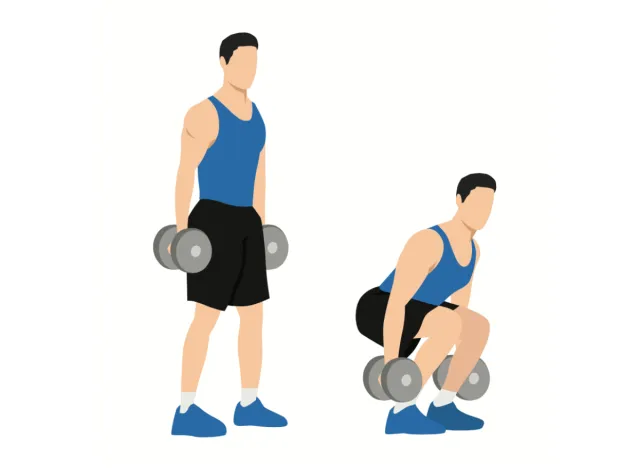

How To Do It:
- Stand with your feet hip-width or slightly wider apart.
- Hold a dumbbell in each hand, letting them hang at your sides.
- Engage your core and lower your body by pushing your hips back like sitting in a chair.
- Lower until your thighs are parallel to the floor, then press through your heels to return to the standing position.
- Repeat for 2 to 3 sets of 10 to 15 reps.
Tip: To avoid knee strain, ensure your knees don’t collapse inward.
2. Dumbbell Deadlifts
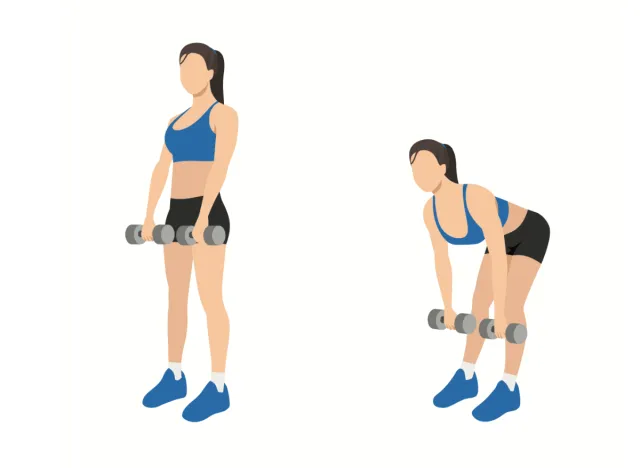

How To Do It:
- Stand with your feet hip-width apart while holding a dumbbell in each hand.
- Keep your back straight and hinge at your hips to lower the dumbbells toward the ground.
- Lower the weights until just above the ground, keeping them close to your body.
- Push through your feet to return to the starting position, extending your hips and knees.
- Squeeze your glutes at the top.
- Repeat for 2 to 3 sets of 10 to 12 reps.
Tip: Avoid rounding your back to prevent injury.
3. Dumbbell Rows
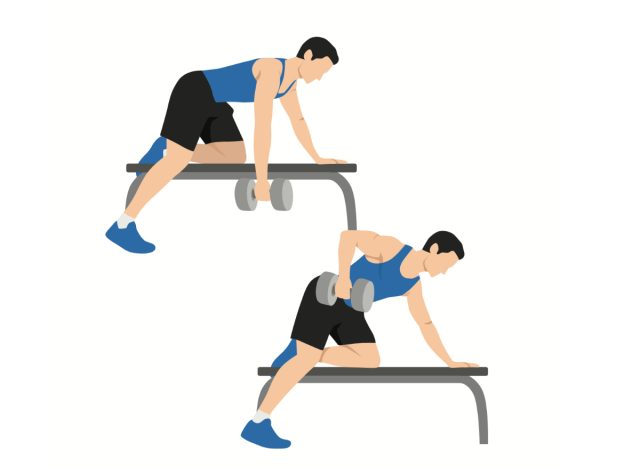

How To Do It:
- Place one knee and one hand on a bench with your other leg extended and your foot flat on the ground.
- Hold a dumbbell in your free hand and pull it toward your hip.
- Keep your back flat and your elbow close to your body.
- Lower the dumbbell slowly and repeat for 2 to 3 sets of 10 to 15 reps on each side.
Tip: Keep your back muscles engaged throughout the movement rather than simply lifting the weight.
4. Chest Press
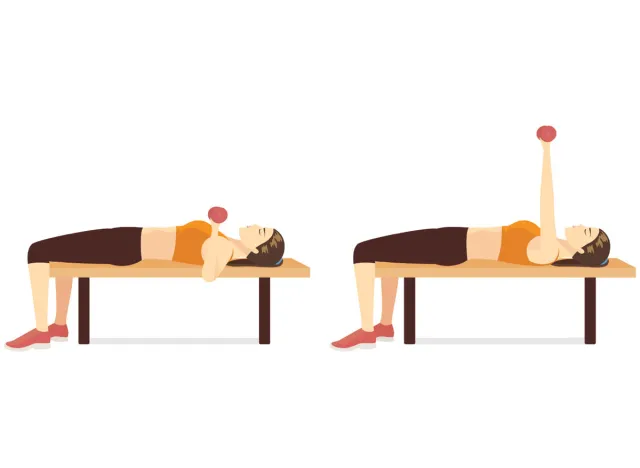

How To Do It:
- Lie on a bench with your feet flat on the floor.
- Hold a dumbbell in each hand at chest level.
- Push the dumbbells up until your arms are fully extended. Keep a slight bend in your elbows.
- Lower the dumbbells with control back to your chest.
- Repeat for 2 to 3 sets of 10 to 15 reps.
Tip: Maintain a neutral spine to avoid arching your back.
5. Overhead Press
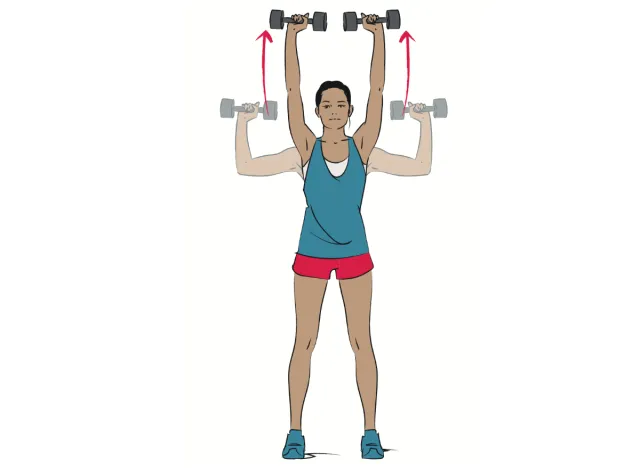

How To Do It:
- Stand with your feet shoulder-width apart, holding a dumbbell in each hand at shoulder height.
- Engage your core and press the dumbbells overhead until your arms are fully extended.
- Lower the dumbbells back to shoulder height with control.
- Repeat for 2 to 3 sets of 10 to 15 reps.
Tip: Keep your core engaged to avoid leaning backward.
6. Loaded Carry
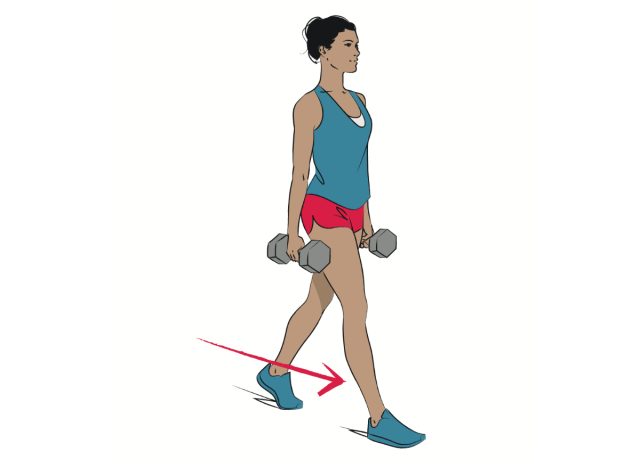

How To Do It:
- Stand with your feet shoulder-width apart and hold a dumbbell in each hand at your sides.
- Keep your core tight and walk forward, taking quick, controlled steps for 50 to 100 feet.
- Lower the dumbbells and rest, then repeat for 2 to 3 rounds.
Tip: Maintain a strong, upright posture throughout the exercise.
Frequently Asked Questions
What is muscle aging?
Muscle aging, also known as sarcopenia, is the natural process of losing muscle mass and strength as we grow older. This can lead to decreased mobility, increased frailty, and a higher risk of injuries.
Why is it important to slow down muscle aging?
Slowing down muscle aging is crucial to maintaining overall health and functionality as we age. Strong muscles support good posture, balance, and mobility, which are essential for everyday activities and reducing the risk of falls and injuries.
What is the #1 workout to slow muscle aging?
The #1 workout to slow down muscle aging is strength training. By incorporating resistance exercises into your routine, you can build and maintain muscle mass, increase strength, and improve bone density. This type of workout helps counteract the loss of muscle and strength that comes with aging.
What are some examples of muscle-strengthening exercises?
- Squats
- Push-ups
- Lunges
- Deadlifts
- Bicep curls
How often should I do strength training to slow muscle aging?
It is recommended to do strength training exercises at least two to three times a week to see benefits in slowing down muscle aging. It’s important to allow for rest days between sessions to allow muscles to recover and grow stronger.






